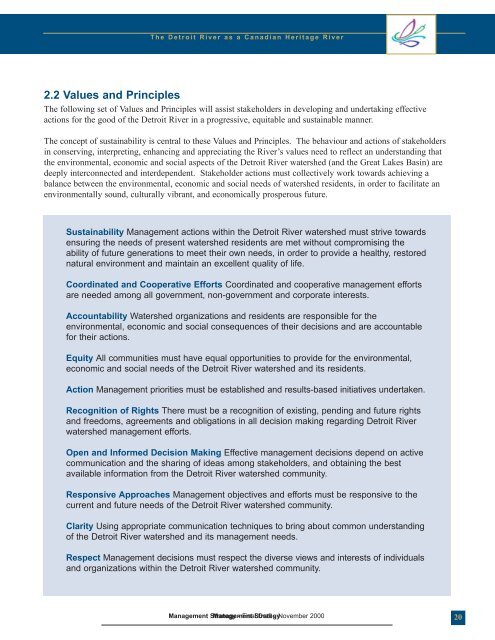Detroit River Management Strategy - Essex Region Conservation ...
Detroit River Management Strategy - Essex Region Conservation ...
Detroit River Management Strategy - Essex Region Conservation ...
Create successful ePaper yourself
Turn your PDF publications into a flip-book with our unique Google optimized e-Paper software.
2.2 Values and Principles<br />
The <strong>Detroit</strong> <strong>River</strong> as a Canadian Heritage <strong>River</strong><br />
The following set of Values and Principles will assist stakeholders in developing and undertaking effective<br />
actions for the good of the <strong>Detroit</strong> <strong>River</strong> in a progressive, equitable and sustainable manner.<br />
The concept of sustainability is central to these Values and Principles. The behaviour and actions of stakeholders<br />
in conserving, interpreting, enhancing and appreciating the <strong>River</strong>’s values need to reflect an understanding that<br />
the environmental, economic and social aspects of the <strong>Detroit</strong> <strong>River</strong> watershed (and the Great Lakes Basin) are<br />
deeply interconnected and interdependent. Stakeholder actions must collectively work towards achieving a<br />
balance between the environmental, economic and social needs of watershed residents, in order to facilitate an<br />
environmentally sound, culturally vibrant, and economically prosperous future.<br />
Sustainability <strong>Management</strong> actions within the <strong>Detroit</strong> <strong>River</strong> watershed must strive towards<br />
ensuring the needs of present watershed residents are met without compromising the<br />
ability of future generations to meet their own needs, in order to provide a healthy, restored<br />
natural environment and maintain an excellent quality of life.<br />
Coordinated and Cooperative Efforts Coordinated and cooperative management efforts<br />
are needed among all government, non-government and corporate interests.<br />
Accountability Watershed organizations and residents are responsible for the<br />
environmental, economic and social consequences of their decisions and are accountable<br />
for their actions.<br />
Equity All communities must have equal opportunities to provide for the environmental,<br />
economic and social needs of the <strong>Detroit</strong> <strong>River</strong> watershed and its residents.<br />
Action <strong>Management</strong> priorities must be established and results-based initiatives undertaken.<br />
Recognition of Rights There must be a recognition of existing, pending and future rights<br />
and freedoms, agreements and obligations in all decision making regarding <strong>Detroit</strong> <strong>River</strong><br />
watershed management efforts.<br />
Open and Informed Decision Making Effective management decisions depend on active<br />
communication and the sharing of ideas among stakeholders, and obtaining the best<br />
available information from the <strong>Detroit</strong> <strong>River</strong> watershed community.<br />
Responsive Approaches <strong>Management</strong> objectives and efforts must be responsive to the<br />
current and future needs of the <strong>Detroit</strong> <strong>River</strong> watershed community.<br />
Clarity Using appropriate communication techniques to bring about common understanding<br />
of the <strong>Detroit</strong> <strong>River</strong> watershed and its management needs.<br />
Respect <strong>Management</strong> decisions must respect the diverse views and interests of individuals<br />
and organizations within the <strong>Detroit</strong> <strong>River</strong> watershed community.<br />
<strong>Management</strong> <strong>Strategy</strong> <strong>Management</strong> - Final <strong>Strategy</strong> Draft - November 2000<br />
20


